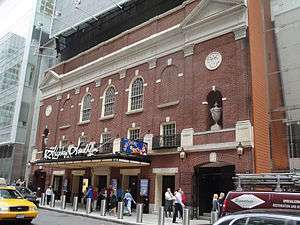Stephen Sondheim Theatre
|
The Stephen Sondheim Theatre in 2011 | |
| Address |
124 West 43rd Street Manhattan, New York City United States |
|---|---|
| Coordinates | 40°45′21″N 73°59′06″W / 40.755869°N 73.985°W |
| Operator | Roundabout Theatre Company |
| Designation | Broadway theatre |
| Capacity | 1055 |
| Production | Beautiful: The Carole King Musical |
| Construction | |
| Opened | 1918 |
| Rebuilt | 2004-2009 |
| Years active |
1918-1968; 2001-2004; 2009-2010 (Henry Miller's Theatre) 1998 (as Kit Kat Club) 2010-present (Stephen Sondheim Theatre) |
The Stephen Sondheim Theatre, formerly Henry Miller's Theatre, is a Broadway theatre operated by Roundabout Theatre Company, located at 124 West 43rd Street, between Broadway and 6th Avenue, in Manhattan's Theater District.
History
Designed in the Neo-classical style by architects Paul R. Allen and Ingalls & Hoffman, it was built by and named for actor-producer Henry Miller. His financial backers were Elizabeth Milbank Anderson, owner of the lot at 124 West 43rd, and Klaw & Erlanger.[1] The original theatre had 950 seats. It opened on April 1, 1918 with the play The Fountain of Youth. It was the first air-conditioned theater in Manhattan.
The theatre had its first hit show with Noël Coward's The Vortex in 1926. Following Miller's death that year, the theater was managed by his son, Gilbert, who bought the Klaw & Erlanger interest and paid 25% of the gross take of each play he produced to the Milbank Memorial Fund, Anderson's legatee.[2] From the 1930s through the late 1960s, the theater enjoyed its golden years, with performances by Helen Hayes, Leslie Howard, Lillian Gish, Douglas Fairbanks, and Ruth Chatterton gracing its stage.
In 1966, the Miller family sold the theatre to the Nederlanders, who sold it on in 1968 to Seymour Durst.[3][4] It showed feature films as the Park-Miller until it became a porn theater called Avon-at-the-Hudson. In 1978, it was converted into the discotheque Xenon. On August 31, 1985, the space opened as SHOUT, a nightclub featuring music from the 1950s and 60s, which operated for six years. The space reopened in 1995 as Club Expo. In 1998, it returned to performance use as the Kit Kat Club, borrowing its name from the club featured in the popular revival of Cabaret it was then housing. It was rechristened the Henry Miller when Urinetown opened in 2001.
The theater was closed in 2004, the interior demolished and subsequently rebuilt by the Durst Organization to make way for the 57-story Bank of America Tower.[5] Its neo-Georgian facade, landmarked by the city, remains, and includes a 1,055-seat theater designed by New York firm of Cook+Fox Architects[6] within the new structure.[7] With bank facilities located above, architects were forced to design and build the new theater underground. This makes the theater one of only two subterranean houses on Broadway.[8] In 2007, the Roundabout Theatre Company announced it would operate the theater as its third Broadway venue.[9] The new theater opened in September 2009 with the Roundabout Theatre Company production of a revival of the musical Bye Bye Birdie.[10]
On March 22, 2010, his eightieth birthday, it was announced that Henry Miller's Theatre would be renamed to honor American composer and lyricist Stephen Sondheim.[11] The official unveiling and lighting of the marquee of the new Stephen Sondheim Theatre took place in a ceremony on September 15, 2010.[12]
The first production to open at the newly renamed Stephen Sondheim Theatre was The Pee-wee Herman Show, which played a limited ten-week engagement from October 26, 2010, through January 2, 2011,[13] and was followed by a revival of Anything Goes starring Sutton Foster and Joel Grey, which opened April 7, 2011, and closed on July 8, 2012. The theater is currently home to the new musical Beautiful: The Carole King Musical.
Productions
|
|
References
- Notes
- ↑ The New York Times June 30, 1921 p.7; The New Yorker June 5, 1943 p.30
- ↑ The New Yorker, June 5, 1943, p.30
- ↑ MILLER THEATER BRINGS $500,000; Producer's Wife Is Selling It to Detroit Chain
- ↑ Henry Miller's Theatre Sold
- ↑ Simonson, Robert. "Henry Miller gets a new theatre" Playbill.com November 28, 2009
- ↑
- ↑ Healy, Patrick. "White Way Gets a 'Green' Theater"The New York Times, May 3, 2009
- ↑ Simonson, Robert. "Henry Miller Gets A New Theatre pg. 2" Playbill.com, November 28, 2009
- ↑ Robertson, Campbell. "Roundabout to Fill a Brand-New 89-Year-Old Theater", The New York Times, May 10, 2007
- ↑ Jones, Kenneth. "Broadway's Newest Theatre, Henry Miller's, Will Open in September With Bye Bye Birdie", playbill.com, May 3, 2009
- ↑ Healy, Patrick. "One More Birthday Gift for Sondheim: A Broadway Theater", The New York Times, March 22, 2010
- ↑ Jones, Kenneth."Light the Lights! Stephen Sondheim Theatre Will Be Unveiled Sept. 15" playbill.com, August 30, 2010
- ↑ "Pee Wee Herman Show Will Celebrate the Holidays on Broadway, Run Extended" on Playbill.com
- Bibliography
- Henderson, Mary C.,The City and the Theatre (2004), Watson-Guptill, ISBN 0-8230-0637-9, pp. 244–245
External links
| Wikimedia Commons has media related to Stephen Sondheim Theatre. |
- Stephen Sondheim Theatre page at Roundabout Theatre Company website
- Stephen Sondheim Theatre at the Internet Broadway Database
- Stephen Sondheim Theatre in the New York City Theater Guide
